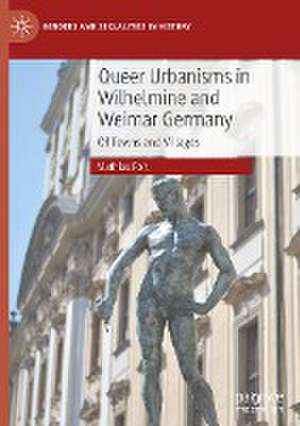Queer Urbanisms in Wilhelmine and Weimar Germany: Of Towns and Villages: Genders and Sexualities in History
Autor Mathias Foiten Limba Engleză Hardback – 29 dec 2023
This book explores the queer history of the easternmost provinces of the German Reich—regions that used to be German, but which now mostly belong to Poland—in the first third of the twentieth century, a period roughly corresponding to the duration of Germany's first queer movement (1897-1933). While the amount of queer historical studies examining entire towns and cities in the German Reich has grown to an impressive size since the 1990s, most of that research concerns, firstly, the usual, large metropoles such as Berlin, Hamburg or Cologne, and, secondly, municipalities located in Germany 'proper'; that is, within its modern borders, not those of the German state in the first half of the twentieth century. Smaller cities (not to mention rural areas) in particular have received very little scholarly attention. This book is therefore one of the first to examine queer history—that of spaces, culture, sociability and political groups specifically—from this geographical perspective.
Din seria Genders and Sexualities in History
-
 Preț: 282.38 lei
Preț: 282.38 lei - 9%
 Preț: 695.10 lei
Preț: 695.10 lei - 18%
 Preț: 629.18 lei
Preț: 629.18 lei - 18%
 Preț: 782.57 lei
Preț: 782.57 lei - 20%
 Preț: 693.39 lei
Preț: 693.39 lei -
 Preț: 390.63 lei
Preț: 390.63 lei -
 Preț: 389.70 lei
Preț: 389.70 lei -
 Preț: 394.51 lei
Preț: 394.51 lei - 15%
 Preț: 589.33 lei
Preț: 589.33 lei - 15%
 Preț: 641.71 lei
Preț: 641.71 lei -
 Preț: 389.11 lei
Preț: 389.11 lei - 15%
 Preț: 646.62 lei
Preț: 646.62 lei - 15%
 Preț: 645.47 lei
Preț: 645.47 lei -
 Preț: 389.70 lei
Preț: 389.70 lei -
 Preț: 385.84 lei
Preț: 385.84 lei - 18%
 Preț: 791.09 lei
Preț: 791.09 lei - 15%
 Preț: 701.90 lei
Preț: 701.90 lei -
 Preț: 391.61 lei
Preț: 391.61 lei - 15%
 Preț: 697.32 lei
Preț: 697.32 lei - 15%
 Preț: 643.34 lei
Preț: 643.34 lei -
 Preț: 388.72 lei
Preț: 388.72 lei -
 Preț: 238.73 lei
Preț: 238.73 lei -
 Preț: 390.63 lei
Preț: 390.63 lei - 15%
 Preț: 644.95 lei
Preț: 644.95 lei - 15%
 Preț: 698.15 lei
Preț: 698.15 lei -
 Preț: 391.61 lei
Preț: 391.61 lei -
 Preț: 418.07 lei
Preț: 418.07 lei - 15%
 Preț: 585.26 lei
Preț: 585.26 lei -
 Preț: 395.47 lei
Preț: 395.47 lei -
 Preț: 387.38 lei
Preț: 387.38 lei - 15%
 Preț: 646.62 lei
Preț: 646.62 lei - 18%
 Preț: 826.41 lei
Preț: 826.41 lei - 15%
 Preț: 697.15 lei
Preț: 697.15 lei -
 Preț: 416.16 lei
Preț: 416.16 lei - 15%
 Preț: 643.34 lei
Preț: 643.34 lei -
 Preț: 390.63 lei
Preț: 390.63 lei - 18%
 Preț: 835.73 lei
Preț: 835.73 lei
Preț: 732.70 lei
Preț vechi: 893.54 lei
-18% Nou
Puncte Express: 1099
Preț estimativ în valută:
140.20€ • 152.77$ • 118.14£
140.20€ • 152.77$ • 118.14£
Carte tipărită la comandă
Livrare economică 23 aprilie-07 mai
Preluare comenzi: 021 569.72.76
Specificații
ISBN-13: 9783031465758
ISBN-10: 303146575X
Pagini: 349
Ilustrații: XVII, 349 p. 5 illus.
Dimensiuni: 148 x 210 mm
Greutate: 0.59 kg
Ediția:1st ed. 2023
Editura: Springer Nature Switzerland
Colecția Palgrave Macmillan
Seria Genders and Sexualities in History
Locul publicării:Cham, Switzerland
ISBN-10: 303146575X
Pagini: 349
Ilustrații: XVII, 349 p. 5 illus.
Dimensiuni: 148 x 210 mm
Greutate: 0.59 kg
Ediția:1st ed. 2023
Editura: Springer Nature Switzerland
Colecția Palgrave Macmillan
Seria Genders and Sexualities in History
Locul publicării:Cham, Switzerland
Cuprins
Introduction.- 1. Queer Spatiality and the Question of Metronormativity.- 2. The National Queer Movement of Wilhelmine and Weimar Germany.- 3. Realities of Queer People in Wilhelmine and Weimar Germany.- 4. Local Queer Self-Organising in Weimar Germany.- 5. Spaces of Queer Contact and Pleasure in Weimar Germany.- 6. Queer Sociability and Events of Queer People in Weimar Germany.- 7. Spatial Contingencies of Queer Sexual Practices and Identities.- Conclusion.
Notă biografică
Mathias Foit received his PhD from the Free University of Berlin, Germany.
Textul de pe ultima copertă
This book explores the queer history of the easternmost provinces of the German Reich—regions that used to be German, but which now mostly belong to Poland—in the first third of the twentieth century, a period roughly corresponding to the duration of Germany's first queer movement (1897-1933). While the amount of queer historical studies examining entire towns and cities in the German Reich has grown to an impressive size since the 1990s, most of that research concerns, firstly, the usual, large metropoles such as Berlin, Hamburg or Cologne, and, secondly, municipalities located in Germany 'proper'; that is, within its modern borders, not those of the German state in the first half of the twentieth century. Smaller cities (not to mention rural areas) in particular have received very little scholarly attention. This book is therefore one of the first to examine queer history—that of spaces, culture, sociability and political groups specifically—from this geographical perspective.
Mathias Foit received his PhD from the Free University of Berlin, Germany.
Caracteristici
Deconstructs myths concerning queer urban life in the twentieth century Discusses the role of class and gender in determining a queer person’s experience with, and of, urban space Explores the queer history of the easternmost provinces of the German Reich
